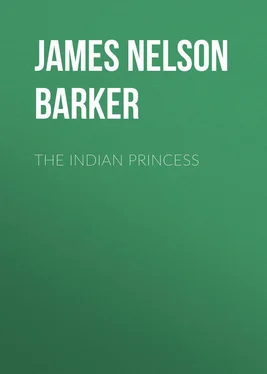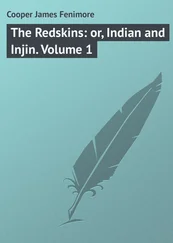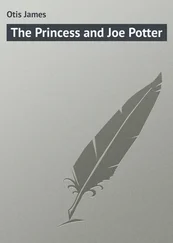James Barker - The Indian Princess
Здесь есть возможность читать онлайн «James Barker - The Indian Princess» — ознакомительный отрывок электронной книги совершенно бесплатно, а после прочтения отрывка купить полную версию. В некоторых случаях можно слушать аудио, скачать через торрент в формате fb2 и присутствует краткое содержание. Жанр: foreign_antique, foreign_prose, foreign_dramaturgy, на английском языке. Описание произведения, (предисловие) а так же отзывы посетителей доступны на портале библиотеки ЛибКат.
- Название:The Indian Princess
- Автор:
- Жанр:
- Год:неизвестен
- ISBN:нет данных
- Рейтинг книги:5 / 5. Голосов: 1
-
Избранное:Добавить в избранное
- Отзывы:
-
Ваша оценка:
- 100
- 1
- 2
- 3
- 4
- 5
The Indian Princess: краткое содержание, описание и аннотация
Предлагаем к чтению аннотацию, описание, краткое содержание или предисловие (зависит от того, что написал сам автор книги «The Indian Princess»). Если вы не нашли необходимую информацию о книге — напишите в комментариях, мы постараемся отыскать её.
The Indian Princess — читать онлайн ознакомительный отрывок
Ниже представлен текст книги, разбитый по страницам. Система сохранения места последней прочитанной страницы, позволяет с удобством читать онлайн бесплатно книгу «The Indian Princess», без необходимости каждый раз заново искать на чём Вы остановились. Поставьте закладку, и сможете в любой момент перейти на страницу, на которой закончили чтение.
Интервал:
Закладка:
James Nelson Barker
The Indian Princess La Belle Sauvage
JAMES NELSON BARKER
In a letter written to William Dunlap, from Philadelphia, on June 10, 1832, James Nelson Barker very naïvely and very fully outlined his career, inasmuch as he had been informed by Manager Wood that Mr. Dunlap wished such an account for his "History of the American Stage."
From this account, we learn that whatever dramatic ability Mr. Barker possessed came from the enthusiasm created within him as a reader of wide range. For example, in 1804, he became the author of a one-act piece, entitled "Spanish Rover," furnished in plot by Cervantes. In 1805, he wrote what he describes as a Masque, entitled "America," in which poetic dialogue afforded America, Science and Liberty the opportunity of singing in unison. He confesses that this Masque was "to close a drama I had projected on the adventures of Smith in Virginia, in the olden time." Then followed a tragedy suggested by Gibbon, entitled "Attila," but Mr. Barker had advanced only two acts when news came to him that John Augustus Stone was at work on a play of the same kind.
In his letter to Dunlap, Mr. Barker deplored this coincidence, which put a stop to "Attila." "But have you never yourself been the victim of these odd coincidences, and, just as you had fixed upon a subject or a title, found yourself superseded – a thing next in atrocity to the ancients' stealing all one's fine thoughts. My comedy of 'Tears and Smiles' was to be called 'Name it Yourself,' when out comes a 'Name it Yourself,' in England, and out comes too a 'Smiles and Tears,' with a widow, an Irishman, and almost all my dramat. pers. I wrote the 'Indian Princess,' and an 'Indian Princess' appears in England. Looking over the old English dramatists, I am struck with the 'Damon and Pythias' of Edwards as a subject, but am scarcely set down to it, when lo, the modern play in London; and what is worse, with the fine part of Pythias absolutely transformed into a snivelling fellow, who bellows like a calf at the prospect of dying for his friend. 'Wallace' was purloined from me in like manner, and several other heroes: at length I fix upon 'Epaminondas', as a 'learned Theban' of so philosophical a cast of character, that even the French had not thought of him for the boards. I form my plot, and begin con amore , when I am told that Dr. Bird has written a 'Pelopidas' and an 'Epaminondas,' comprehending the whole life of the latter."
Then, having finished with his diatribe against coincidence – a diatribe which excellently well shows the channels in which Barker's literary mind ran, and likewise the closeness with which he followed the literary activity of the period among his associates, he continued in his narrative to Dunlap:
"'Tears and Smiles' was written between May 1 and June 12, of 1806, with the character of a Yankee intended for Jefferson. By the way, such a Yankee as I drew!" he writes. "I wonder what Hackett would say to it! The truth is, I had never even seen a Yankee at the time."
Then, in view of Barker's political tastes which, in consideration of the dramatists of those days, one must always take into account, he wrote a piece called "The Embargo; or, What News?" borrowed from Murphy's "Upholsterer," and produced on March 16, 1808.
Between this play and 1809, "The Indian Princess" was written, and what Barker has to say about it will be quoted in its proper place.
Right now, we are letting him enumerate his own literary activities, which were many and continuous.
In 1809, he Americanized Cherry's "Travellers," a dramatic method which has long been in vogue between America and England, and has, in many respects, spoiled many American comedies for English consumption.
In 1812, at the request of Manager Wood, Mr. Barker made a dramatization of Scott's "Marmion," and, strange to say, it was announced as being written by Thomas Morton, Esq.
"This was audacious enough in all conscience," says Mr. Barker, "but the finesse was successful, and a play most probably otherwise destined to neglect, ran like wild fire through all our theatres." On March 24, 1817, there was acted in Philadelphia, Barker's "The Armourer's Escape; or, Three Years at Nootka Sound," described by Mr. Barker as a melodramatic sketch, founded on the adventures of John Jewett, the armourer of the ship Boston , in which Jewett himself assumed the hero's rôle. This same year he likewise wrote "How to Try a Lover," suggested by Le Brun's novel. Finally, in 1824, on March 12, there was performed "Superstition," a five-act drama. This closed the account that Barker sent to Dunlap.
We see from it a number of things relative to placing Barker as a literary personage. First, his interest in literature made him draw from all sources, combining Scott with Holinshed, and turning, as was the wont of the cultivated American of that day, to the romantic literatures of the past. Secondly, Barker's interest in Colonial History was manifest by his return, time and time again, to Colonial records for dramatic material. Furthermore, as a participant in the political disputes of his day, it would have been a surprise had Barker not directed his pen to some reflection of the discussions of the period.
James Nelson Barker was the son of the Honourable John Barker, one-time Mayor of Philadelphia, and ex-Revolutionary soldier. He was born in that city on June 17, 1784.
His education was received in Philadelphia, and he must have entered the literary and political arenas at an early age. After the fashion of the day, he was trained in the old-time courtesy and in the old-time manner of defending one's honour with the sword, for it is recorded that he was once severely wounded in a duel.
At the outbreak of the War of 1812, he received a commission, fighting mostly on the Canadian frontier, and winning distinction as a Captain of Artillery. After the close of the War, he was supported by the Democratic Party, and elected Mayor of the City of Philadelphia. Later, he upheld "Old Hickory" for the Presidency, and, after filling the position of the Collector of the Port of Philadelphia from 1829-1838, on the election of Van Buren to the presidency, he was appointed First Controller of the Treasury, and moved to Washington. From that time on, he was connected with the highest offices in the department. His pen was continually dedicated to the support of Democracy, and, during the years from 1832-1836, he figured as a contributor to many papers of the time on political topics. He lived until March 9, 1858.
I have selected his play, "The Indian Princess," 1 1 The/Indian Princess;/or,/La Belle Sauvage./An Operatic Melo-Drame./In Three Acts./Performed at the Theatres Philadelphia and/Baltimore./By J. N. Barker./ First Acted April 6, 1808./Philadelphia,/Printed by T. & G. Palmer,/For G. E. Blake, No. 1, South Third-Street./1808./
as an example of the numberless dramas that grew up around the character of Pocahontas. The reader will find it particularly of interest to contrast with this piece G. W. P. Custis's "Pocahontas; or, The Settlers of Virginia" (1830), and John Brougham's burlesque, "Po-ca-hon-tas; or, The Gentle Savage."
The Indian Drama, in America, is a subject well worth careful attention. There are numberless plays mentioned by Laurence Hutton in his "Curiosities of the American Stage" which, though interesting as titles, have not been located as far as manuscripts are concerned.
Barker's "The Indian Princess" is one of the earliest that deal with the character of Pocahontas. The subject has been interestingly treated in an article by Mr. E. J. Streubel ( The Colonnade , New York University, September, 1915).
Barker had originally intended his play, "The Indian Princess," to be a legitimate drama, instead of which, when it was first produced, it formed the libretto for the music by a man named John Bray, of the New Theatre. In his letter to Dunlap, he says:
Читать дальшеИнтервал:
Закладка:
Похожие книги на «The Indian Princess»
Представляем Вашему вниманию похожие книги на «The Indian Princess» списком для выбора. Мы отобрали схожую по названию и смыслу литературу в надежде предоставить читателям больше вариантов отыскать новые, интересные, ещё непрочитанные произведения.
Обсуждение, отзывы о книге «The Indian Princess» и просто собственные мнения читателей. Оставьте ваши комментарии, напишите, что Вы думаете о произведении, его смысле или главных героях. Укажите что конкретно понравилось, а что нет, и почему Вы так считаете.












